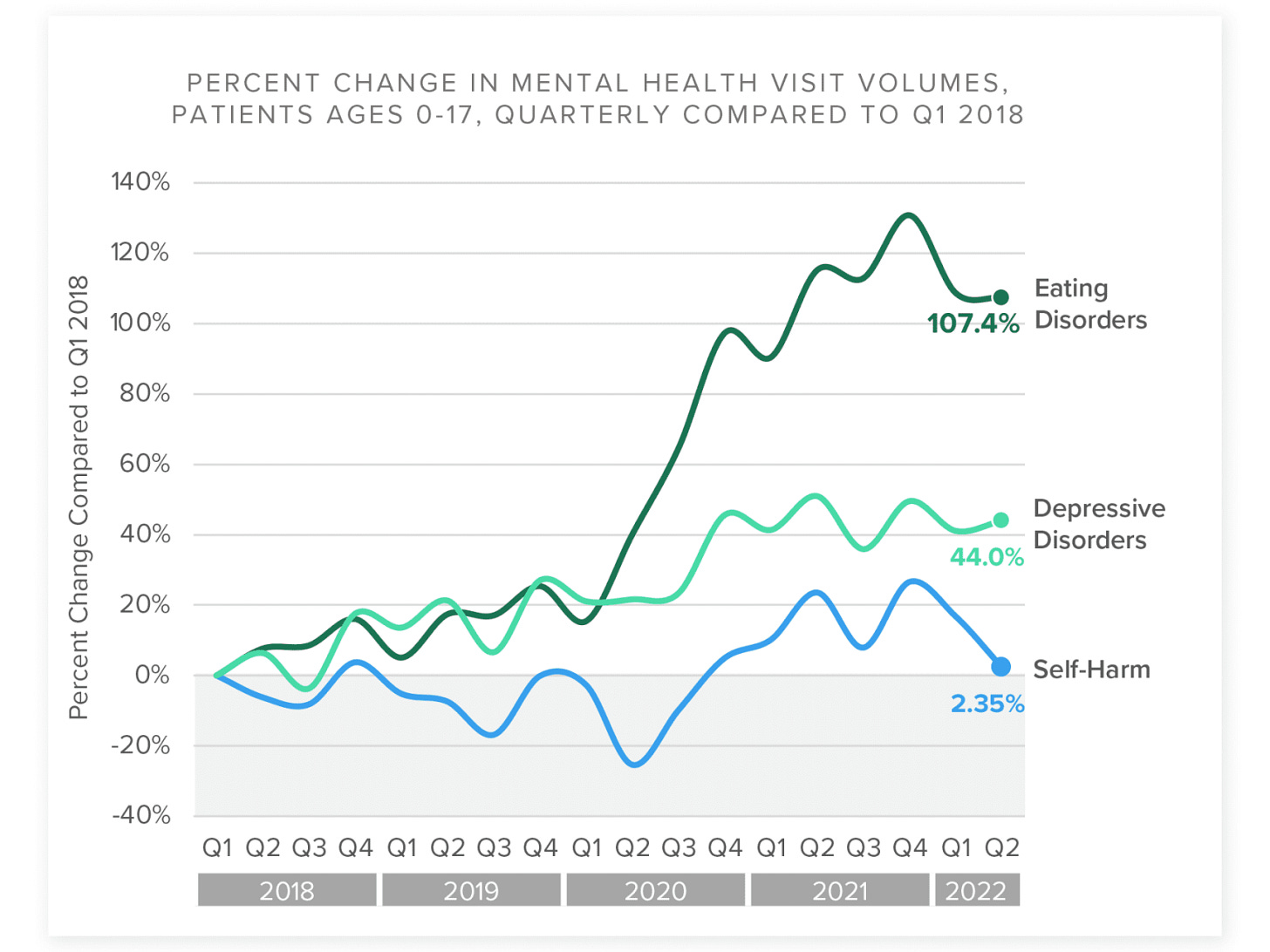What parents need to know about eating disorder content on social media
Some tips from my kids and other experts on how to manage exposure to harmful misinformation on apps and AI
Eight years ago this month, I dropped my seemingly happy and healthy 18-year-old off at college on the West Coast. Three months later, when they came home for the holidays, they were neither happy nor healthy. In fact, I did not recognize the child who came to Christmas dinner. They wouldn’t eat, they were obsessed with what everyone else was eating, and they were noticeably thinner.
I didn’t know anything about eating disorders back then, but by the time break was over, it was clear my kid had been sucked into vortex that was stronger than both of us. And it was just the beginning of a many years-long journey full of suffering for my kid, Em, and for our whole family as we struggled to save them from anorexia.
I now know that Em’s disorder actually began back in high school when they were using social media to go deep into the culture of disordered eating. Years before leaving for college, they created a blog space on Tumblr to record their body measurements and research fake science about how to burn calories; they used Pinterest to create a private board dedicated to anorexia inspiration; and they used Instagram to view photos of patients as a way to trigger and recommit to their disorder.
I was oblivious to Em’s online activities, but they weren’t atypical among young people with burgeoning eating disorders. The U.S. Surgeon General Vivek Murthy issued an advisory earlier this year warning parents about the adverse effects of social media on teen mental health – specifically the way it can encourage body dissatisfaction, dysmorphia and disordered eating in adolescent girls.
According to one study, 97 percent of children as young as 12 are now on social media — even though almost 70 percent of them said social media makes them feel stressed, anxious and depressed. In addition, research shows 22 percent of all children and adolescents show symptoms of disordered eating. Given that social media is addictive and time-consuming, adding hours of scrolling through fat-phobic and pro-eating disorder content — or even exposure to posts that provide harmful dieting or exercise advice — it’s no wonder hospitalizations for eating disorders have doubled among adolescent girls.
Some social media platforms have made efforts to block pro-eating disorder content and to provide eating disorder resources, but harmful content is constantly being created and circulated. Young people in online communities share tips to lose weight; they create hashtags and abbreviations to evade filters to share harmful images on Twitter; they create YouTube videos compiling low-calorie diets; and they form group chats on Discord and Snapchat to share their weight and encourage others to fast. Even AI apps are being enlisted to aid eating disorders – just ask ChatGPT: “Can you create a daily meal plan for me that is under 500 calories?”
Knowing what I know now, I would have spent more time researching and asking about what my kids were being exposed to online — and that was a over decade ago, before so many of the apps available today were prevalent. My point with this post is not to scaremonger, but to encourage a conversation about the eating disorder pollution online, and how we can make our kids less vulnerable to it. Unfortunately, there’s a lot of advice about what to avoid, but not how to avoid it. That’s why I asked two of my kids who have struggled with eating disorders to share their tips with parents about how to navigate social media and disordered eating, and what they wished they – and I – had known when they were in high school and college:
Abby, 27:
· I didn’t struggle with social media because of the hot, skinny models – the largest danger of social media for me were the forums, blogs, Twitter accounts and subreddits I stumbled on while looking for weight loss tips. I ended up finding extremist “pro-ana” and “pro-mia” forums and chats online, which makes having an eating disorder seem both cool and communal. People in these communities are almost exclusively girls 15- to 19-years-old.
· Check out who your kid is following every once in a while. If you find anything suspicious, check in let them know you noticed and show them alternative accounts to follow. For example, point them to accounts that highlight how exactly celebs are photoshopping their pics to make them look different, or art accounts, or accounts that are social justice forward (especially from kids their age). Kids are interested in things that are relevant to their lives, so tap into that and maybe they’ll find a cool internet niche they want to belong to.
· Explain that eating disorders are ego dystonic and not someone’s conscious thoughts. That’s why people who have eating disorders can express cruel thoughts about themselves or others’ bodies. And if your kids are having those thoughts, they need to talk about it – with you and/or a therapist – so they don’t become deluded by their own brains.
· TALK ABOUT FAT PEOPLE, FOOD, AND YOURSELF POSITIVELY!!!! And if you don’t feel positively about yourself and/or fat people, time to do some self-exploration. The most important thing we do for our children is model how to navigate the complexities of life. When you talk about yourself or others negatively, your kids’ brains tune in closely to help them determine what is desirable to a group and what gets them excluded from the pack.
· Cook with your kids, eat with your kids, ask them questions and be curious about their lives, their friends, their interests and hobbies without judgment.
Em, 26:
· I took a two year break from social media after I was in a higher level of care. It was important for me to establish a sense of myself outside the virtual world. I don’t engage with social media if I feel disconnected from myself in order to avoid a comparing mindset. I also try to do social media only if it’s with a different purpose, for example for work and or my band and or connecting with friends.
· Unfollow anyone who proselytizes fake science. Make sure the experts you follow are certified and credentialed. Not everyone who has an Instagram page is an expert. Diet culture is very sneaky!!!!
· Unfollow people who you meet in recovery or who you know have an eating disorder. You can always follow them again later you’re in a more stable recovery situation and you think that person’s online presence would support your recovery going forward.
· Remember that there are spaces on social media you can us to unlearn and challenge stigma and fat phobia. These resources can be incredibly beneficial to recovery.
· Talk to your therapist when your brain gets sticky to help you realize social media is not real life to help you try to detach. There are protective factors against algorithms and cognitive distortions and internalized beliefs and targeted ads and all the other ensnaring parts.
· You can quiet suggested content in your feed by reporting or muting. Eventually the algorithms respond. For example, if you accidentally stumble on an influencer’s “What I Eat In a Day” reel, you can be sure similar videos don’t flood your reels.
· Tell your kids to be intentional about who they follow. Try to understand together the implications of different privacy settings. Who sees what? And if you were to run into someone you follow on Instagram in a grocery store, would you say “hi?” If not, unfollow.
Because of what my kids have been through — and thanks to some amazing clinicians and therapists — I’ve learned a lot about eating disorders over the last eight years. I make myself available to other parents to provide advice or references for care facilities (we’ve had both good and bad experiences, and I can tell you which centers to avoid). DM me on Instagram and I’ll respond.
Finally, if you think your kid isn’t at-risk, consider that three out of four children as young as 12 dislike their bodies and are embarrassed by the way they look — that figure jumps to eight in 10 young people when they’re between the ages of 18 and 21. Social media could be the trigger that turns their insecurities into a full-blown mental illness.
Additional tips from experts:
Monitor and discuss your teen’s online activities: Pay close attention to and monitor which social media pages and accounts your teen is following. Talk to them openly and directly about any concerning things see.
Remind your teen that much of the “wellness culture” on social media is unhealthy: Social media is designed to promote unrealistic, unattainable and dangerous expectations around weight, appearance and body image. It relies on machine-learning algorithms to serve up content based on past content searched or viewed. So simply searching for a healthy recipe or weight loss article can lead to a feed filled with diet and weight loss content or, worse, messaging from groups promoting eating disorder lifestyles and tips.
Talk to your teen about where and how to find legitimate information: Very little of the “wellness” content on social media is authentic or scientifically backed. Make sure content is coming from people with the proper credentials and experience to advise you. If you and your teen have questions about weight, nutrition or exercise, talk to a professional.
Help your teen understand the comparison culture: Comparison culture is the pervasive phenomenon in which individuals compare themselves to others and often feel inadequate or inferior. Talk to your teen about this culture and is fostered and promoted on social media. Point out examples when you see it and have discussions about how it makes them feel, and how they can strengthen their own sense of worth.
Use technology to reduce unwanted messaging: Change your internet and social media settings to try to minimize weight-loss advertisements and unfollow or block any accounts that make you or your teen feel negative, anxious or guilty about their/your body.
Set a time allowance or take breaks: If you or your teen are feeling badly after using social media, limit your own and your teen’s social media usage. At times, scheduling a complete break from social media can be incredibly helpful.
Seek professional help: If you or a loved one are struggling, reach out for help from your physician. In addition, several organizations and resources available online can provide support, encouragement, and link you to eating disorder professionals in your community.
· ANAD- online eating disorder support: www.anad.org
· National Eating Disorders Association (NEDA): www.nationaleatingdisorders.org
· The Body Positive: www.thebodypositive.org
· Eating Recovery Center: www.eatingrecoverycenter.com







Another aspect of this conversation that is important to be aware of is our own relationship with our body and the foods we eat. We as parents are modeling eating behaviors and body self talk. We should be conscientious of not talking badly about ourselves and our body in front of our children. Our children are a reflection of us and if we say that our body is "bad" by extension we are inadvertently saying that their body is bad too.